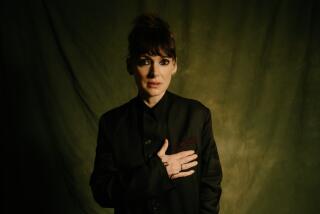Winslet carries ‘Reader’
- Share via
It is Kate Winslet’s face and Kate Winslet’s face alone that looks out from the cover of the new “now a major motion picture” paperback edition of Bernhard Schlink’s exceptional novel, “The Reader,” and that’s as it should be.
For though “The Reader” costars the gifted Ralph Fiennes and gives a lot of screen time to a young actor named David Kross, it is Winslet’s haunting performance that gives the film what success it has.
Schlink’s memorable book, a powerhouse story of guilt and responsibility that has connections to the Holocaust, was a huge international success when it was published in 1995. It was translated into 40 languages and became the first German novel to get to No. 1 on the New York Times bestseller list.
It’s taken this long to get “The Reader” to the screen in part because of the exigencies of the movie business and in part because it is not the simplest story to film. Though it has a potent story, “The Reader” is easily as philosophical as it is melodramatic, as deeply involved with what goes on in the mind of its narrator as it is in what he does.
In attempting to solve this problem, screenwriter (and accomplished playwright) David Hare and director Stephen Daldry (“The Hours”) have in part frittered away the story’s emotional force. It is only, frankly, the strength of Winslet’s performance that rises above conventional surroundings and makes “The Reader” the experience it should be.
That narrator is Michael Berg, introduced in the Germany of 1995 as a successful attorney played by Fiennes. Successful Berg might be, but he is also enigmatic, distant and not very open, as he apologetically explains at one point to his estranged daughter.
Extensive flashbacks, alternating with more modern scenes, show how Berg got that way. In 1958, when he was 15, he was stricken with scarlet fever (inexplicably changed from the book’s hepatitis) on a German street and helped home by a strange woman (Winslet) in front of whose apartment building he collapsed.
Once Berg has recovered, he goes to find the woman, whose name is Hanna, to thank her. She is 36, more than twice his age, but that doesn’t prevent a kind of charge passing between them and doesn’t stop Hanna from almost immediately seducing the boy.
This seduction develops into a relationship that lasts long enough to develop qualities of its own. Hanna, as it turns out, likes to be read to as much as she enjoys the sex, and soon Berg is reading her everything from “Tintin” to “Lady Chatterley’s Lover.” While Winslet’s remarkably expressive face and bearing convey vulnerability as well as passion, the difference in ability between her and Kross, the young actor who plays Berg (the film waited till he was 18 to shoot the bedroom scenes), is noticeable.
The affair ends all of a sudden, and the next time Berg sees Hanna it is under starkly different circumstances. It is years later; he is in law school, taking a seminar (from Bruno Ganz’s professor) that involves going to a Nazi war crimes trial for low-level concentration camp guards, and there, at the defendant’s table, sits Hanna.
It is hard to overstate the impact Winslet makes in the trial scenes, even though she says very little. Alternately despairing, distraught and defeated, she allows conflicted emotions to play across her face as she struggles with the life and death decision of which secrets to reveal and which to hide away.
From here on in, “The Reader” is at its strongest, as the film’s series of twists that play out over years add to the dramatic and philosophical content. It’s also here that “The Reader’s” concerns with the guilt-ridden interplay between generations, with whether it is even possible to come to terms with what people we love have done, gain a sharper focus.
Though Fiennes’ increased screen time helps the film, he never seems to have enough to do. He and young Kross are also hampered by their involvement with the film’s most pat and conventional aspects, including the larger role given both to Berg’s future wife and their aforementioned daughter.
Fortunately, “The Reader” (opening Friday) is able to recover its focus. Though this remains a reserved film in which the underlying material is stronger than what’s been done with it, enough of it has been retained to keep the enterprise on point. Especially when Winslet is on the screen.
--
--
‘The Reader’
MPAA rating: R for some scenes of sexuality and nudity
Running time: 2 hours, 3 minutes
Playing: At selected theaters beginning Friday
More to Read
Only good movies
Get the Indie Focus newsletter, Mark Olsen's weekly guide to the world of cinema.
You may occasionally receive promotional content from the Los Angeles Times.










